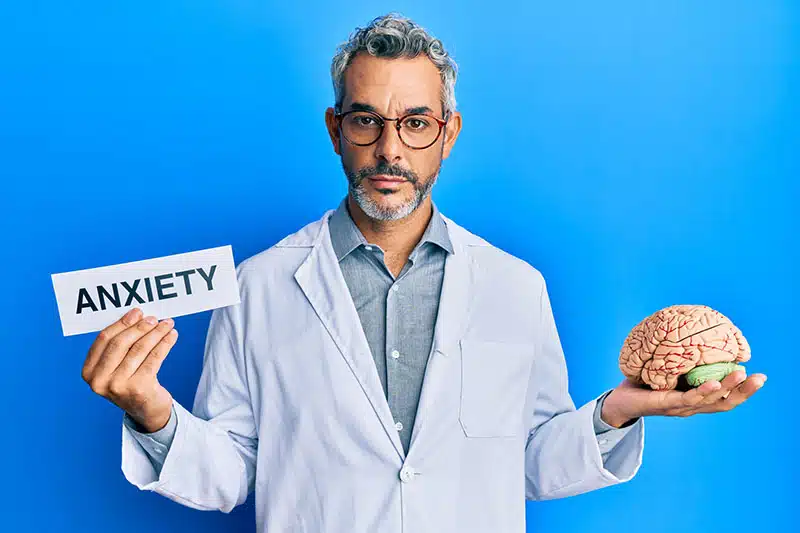 Shop Our CBD Vape Pen Range
Shop Our CBD Vape Pen Range
Faced with rising levels of stress and anxiety in today's world, many of us are struggling to cope. But what exactly is anxiety? There has been much research done on the subject over the years, examining not only its causes but also trying to uncover how it affects our brains. In this blog post, we will dive into the science of anxiety and the use of CBD for management of anxiety.
Anxiety is an emotion that is fundamentally tied to survival instincts. It's our body's way of letting us know when we perceive danger and prepares us to respond, commonly known as the "fight-or-flight" response. For many people, this feeling can occur without external threats, which is when anxiety becomes a disorder. Research has shown that anxiety and how it impacts the brain has direct links to fear conditioning, cognitive processing, and neurotransmitter regulation. Certain areas of the brain are known to be responsible for worry and stress: the hippocampus processes memories associated with fearful events; the amygdala detects threatening stimuli from within and outside one’s environment; and the prefrontal cortex helps regulate behaviour related to emotions like fear and anxiety. All in all, understanding what happens inside our brains when we experience chronic levels of fear will help us develop more effective ways to combat not only anxiety but also a whole range of mental health issues.
Anxiety-provoking thoughts and behaviours are usually the result of a chain of events that begin with chemical reactions in the brain. While these reactions vary for each person, some common neurotransmitters like serotonin, norepinephrine, and gamma-aminobutyric acid (GABA) have been known to trigger feelings of fear and stress. To combat anxious thinking, it can be helpful to recognize which element in this cycle may be contributing most significantly. By understanding what is causing the neurochemical reactions that lead to anxiety, individuals can work towards rebalancing those hormones or applying other calming strategies like yoga or deep breathing to alleviate their symptoms.
Anxiety, in all its forms, can be an extremely isolating and debilitating condition. Yet its various manifestations – such as social anxiety and generalised anxiety disorder – are so unique that they sometimes require specific approaches to ensure an effective diagnosis and treatment plan. To better understand the levels of anxiety we experience, it is key to first determine the type of anxiety a person suffers from. Social anxiety, for instance, is essentially a fear of being judged by others, while generalised anxiety disorder is characterised by excessive insecurity and worry about a wide range of everyday activities. Only when the source of one's stress has been identified can steps be taken to make meaningful changes in their behaviour and lifestyle. With a better understanding of different types of anxieties, those who suffer from them can begin tackling their issues head on and reclaim their lives.
Anxiety is a condition that can affect a person's life in many ways, both physically and emotionally. In recent years, research has sought to better understand the biology of anxiety through exploring the brain regions associated with it. Two of the key areas are the amygdala and hippocampus; these interconnected structures are responsible for playing an important role in our response to danger, as well as forming memories. By examining these parts of our brains, we may be able to gain more insight into why certain people experience higher levels of anxiety than others. This type of information could potentially lead to new treatments that target specific areas, leading to improved outcomes for those living with this often debilitating condition.
CBD is a revolutionary compound found in the cannabis plant. It is increasingly being studied and integrated into the health and wellness field due to its beneficial effects on our body. CBD oil vape pen kit has the potential to have an impact on the brain. This natural substance has shown the potential to improve cardiovascular health, better digestion, and stronger immunity although these studies are very early stage and no clear link has been established. CBD has at the least demonstrated itself as an invaluable asset that can be used for general health and wellbeing with very few reported side effects.
CBD and CBD vape pens are becoming increasingly popular as a means to help keep calm and relaxed. This is why CBD vape pens are also known as anxiety pens. While results may vary from person to person, many report that using these alternatives can be a valuable daily tool for those dealing with stress. However, using CBD might not be suitable for everyone - it is important to consult with a medical professional before using it, as individual experiences vary among different people. Regardless, it is tough to argue against trying something new that is known to have little side effects. As such, investigate the potential benefits seen from using CBD or best CBD vape pen for nausea - you just may end up being pleasantly surprised


This article is authored by Dr Casey Abrahamsmen. Dr Abrahamsmen is a board certified physician with over 13 years of experience in internal medicine and pain management. He practises Palliative care at a hospital in Venezuela and is a strong advocative for CBD and believes CBD has a major role to play towards healthy non addictive pain management habits. You can read more about Dr Abrahamsmen here.
This article was peer-reviewed by Dr M Mansoor Siddique (PhD). Dr Siddique has over eight years of experience working with CBD and CBD products.
Disclaimer: All of our products are not intended to diagnose, treat or cure any disease. It is recommended to check with doctor before starting a new dietary supplement program. All CBD products sold have less than 0.2% THC content and abide by both EU an UK law.